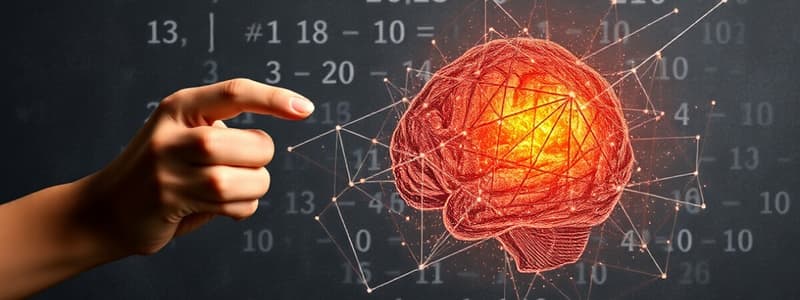Podcast
Questions and Answers
What are algorithms primarily used for in problem-solving?
What are algorithms primarily used for in problem-solving?
- To generate step-by-step procedures that guarantee a solution (correct)
- To simplify thinking strategies
- To promote creative thinking
- To find solutions through sudden realization
Which cognitive strategy is described as a simpler thinking approach that reduces options?
Which cognitive strategy is described as a simpler thinking approach that reduces options?
- Heuristic (correct)
- Algorithm
- Insight
- Trial and error
What is a key feature of insight as a problem-solving strategy?
What is a key feature of insight as a problem-solving strategy?
- It is more predictable than heuristics
- It results from sudden realization (correct)
- It relies on a step-by-step algorithm
- It often involves prolonged contemplation
What does confirmation bias lead individuals to do?
What does confirmation bias lead individuals to do?
What role does the right temporal lobe play in problem-solving, according to brain scans?
What role does the right temporal lobe play in problem-solving, according to brain scans?
How does trial and error differ from algorithm-based problem solving?
How does trial and error differ from algorithm-based problem solving?
What was the outcome of Peter Wason's experiment with the three numbers?
What was the outcome of Peter Wason's experiment with the three numbers?
Which of the following is NOT a characteristic of cognitive tendencies in problem-solving?
Which of the following is NOT a characteristic of cognitive tendencies in problem-solving?
What is an example of fixation that inhibits problem solving?
What is an example of fixation that inhibits problem solving?
Which statement best describes intuition?
Which statement best describes intuition?
What can fixation result from?
What can fixation result from?
How can intuition affect decision-making?
How can intuition affect decision-making?
What role does the unconscious mind play in intuition?
What role does the unconscious mind play in intuition?
When might it be beneficial to 'sleep on' a complex decision?
When might it be beneficial to 'sleep on' a complex decision?
How do smart thinkers typically use intuition in their decision-making?
How do smart thinkers typically use intuition in their decision-making?
What is confirmation bias?
What is confirmation bias?
Flashcards
Problem Solving Strategies
Problem Solving Strategies
Different methods used to find solutions to problems.
Algorithms
Algorithms
Step-by-step procedures that guarantee a solution, but can be slow.
Heuristics
Heuristics
Simpler thinking strategies to reduce options and find solutions faster.
Insight
Insight
Signup and view all the flashcards
Confirmation Bias
Confirmation Bias
Signup and view all the flashcards
Brain Activity—Insight
Brain Activity—Insight
Signup and view all the flashcards
Trial and Error
Trial and Error
Signup and view all the flashcards
Example of Heuristic
Example of Heuristic
Signup and view all the flashcards
Fixation
Fixation
Signup and view all the flashcards
Mental Set
Mental Set
Signup and view all the flashcards
Intuition
Intuition
Signup and view all the flashcards
Unconscious Influence
Unconscious Influence
Signup and view all the flashcards
Smart Thinking & Intuition
Smart Thinking & Intuition
Signup and view all the flashcards
Benefits of Deliberate Thought
Benefits of Deliberate Thought
Signup and view all the flashcards
Two-Track Mind
Two-Track Mind
Signup and view all the flashcards
Study Notes
Problem Solving Strategies and Obstacles
- Problem-solving strategies: Trial and error, algorithms (step-by-step procedures guaranteeing a solution), heuristics (simpler thinking strategies), and insight (sudden realization).
- Algorithms: Guaranteed solutions but can be laborious, such as trying every letter combination to solve SPLOYOGHYG.
- Heuristics: Faster strategies that simplify problem-solving by eliminating less likely options (e.g. grouping similar letters in SPLOYOCHYG).
- Insight: Sudden comprehension of a problem's solution, often involving activity in specific brain regions (frontal lobe for focusing, right temporal lobe for revelation). Insight is not limited to humans; chimpanzees and birds also demonstrate similar problem-solving abilities.
Cognitive Tendencies Hindering Problem Solving
- Confirmation bias: Tendency to seek evidence confirming one's view while ignoring contradicting evidence. Examples from the Wason experiment (students' assumption the rule was counting by twos when another rule explained the pattern).
- Fixation: Inability to view a problem from a fresh perspective, hampering effective decision-making.
- Mental set: Tendency to approach a problem with a mindset based on previous successes, even if newer strategies might be more effective (e.g. numerical pattern in the example sequence O-T-T-F-?).
The Power and Perils of Intuition
- Intuition: Recognition born of experience (implicit knowledge), leading to quick judgements based on learned associations in experienced individuals (e.g. nurses, firefighters).
- Adaptive Intuition: Intuition is generally useful because learned associations from experience aid in survival and decision-making.
- Unconscious Processes: Intuition relies on unconscious mind processes, which play a role in complex decision-making. Although studies are not uniform, sometimes unconscious thought can improve decision-making in a complex scenario.
- Critical evaluation: Smart thinkers require intentional critical thinking beyond immediate intuitive judgements.
Studying That Suits You
Use AI to generate personalized quizzes and flashcards to suit your learning preferences.




